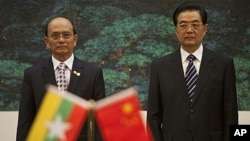North Korean leader Kim Jong-Il has returned to Pyongyang after a week-long visit to close ally and neighbor China. Also this week, Burma's new president, the ex-general Thein Sein, traveled to Beijing for talks with Chinese officials.
When he left Beijing Friday after a week-long visit to China, North Korean leader Kim Jong-Il said in a letter to President Hu Jintao that ties between the two countries are "sealed in blood."
As is typical for the North Korean leader's secretive trips abroad, the exact purpose of his third trip to China in a year was unclear. Chinese officials described his visit as an economic study tour. On Thursday, China's Xinhua news agency quoted Kim as saying his government is focusing its attention on economic development.
Impoverished North Korea remains heavily reliant on Beijing's economic assistance and political influence. But it is unclear if the country is seriously interested in abandoning its centrally planned economic model.
Professor Jonathan Pollack is a senior fellow with the John L. Thornton China Center in Washington. He says Beijing does not assert as much influence over Pyongyang as many in the West believe, and like other countries, is secretly hoping for a power change.
"China does feel it is among the very few states - maybe the only state - that has the kind of reach into the North Korean system, though I would argue that their influence is often greatly exaggerated, and is not that great," said Pollack. "But they are making calculations on the expectations that inevitably, there must be some kind of internal shift in NK to some extent."
While Pollack says China's relationship with North Korea is partly based on the uncertainty of Pyongyang's future, he says the relationship with Burma is quite different.
Burmese leader President Thein Sein, the former general of the military junta, visited Beijing Friday for talks with top leaders. The trip is the first bilateral visit by Thein Sein since he took office at the end of March as head of a nominally civilian government.
Pollack says that China has more economic incentives at stake in its relationship with Burma than North Korea.
"I think for China, what it seeks in the Burmese case, are the not insignificant economic equities," added Pollack. "The economic equities do not exist with North Korea at least not at this point. North Korea in that sense, is much more a demander of China, seeking whatever economic and energy support it can."
China has become Burma's second largest trading partner and its largest foreign investor, with Beijing reporting investments of more than $15 billion last year. Much of the funding has gone toward the construction of twin pipelines that will carry oil and gas across Burma to southern China.
Chinese officials are expected to have questions about security along the pipeline route in Shan state, which is troubled by an ethnic insurgency.
Pollack says China's relationship with Burma, the first country to recognize the Chinese Communist Party's rule in 1949, is a longstanding and complex one and Beijing is keen to keep the status quo.
"Burma is a state that is deeply suspicious of the outside world," Pollack noted. "If the Chinese see some modest inroads they can make, primarily by economic means and maybe to a degree by some amount of political validation, they are prepared to attempt it."
While Beijing's relationship with the North Korean and Burmese governments raises concerns abroad about China's motives, Pollack and other experts argue that maintaining such close ties with neighboring countries are vital for Beijing.
Observers Question Motives as Burmese, N. Korean Leaders Visit Beijing











